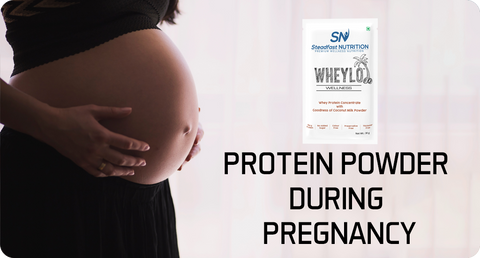Diet consumed during pregnancy plays a very pivotal role in determining the health of both mother and growing foetus. Insufficiency of nutrients might result in certain health complications. During pregnancy requirements of almost all the nutrients are increased. In this article, we will talk about one such macronutrient - Protein.
As per ICMR NIN, recommended dietary allowance of proteins for pregnant women ranges between 55 to 78 grams per day. Low Birth Weight is a common health issue across the world. Approx. 40% of newborns in India fall under the low birth weight category, weighing less than 2500 grams. Protein deficiency is one of the causes of low birth weight, which eventually might affect infant growth and increase the risk of renal and cardiovascular disorders.
Protein has a significant contribution to the growth of the foetus. It is a building block of our cells and tissues. It is also needed for muscles, hormones, enzymes, antibodies, amniotic fluid, etc. Therefore, the diet should be rich in protein-rich foods like eggs, meat, chicken, fish, pulses, lentils, legumes, nuts, peas and soybean.
In case of insufficient availability of dietary sources, being vegetarian or vegan might restrict the food choices. In such cases, protein supplements are a great way to fulfil increased protein needs. Some of the reasons which protein supplements may prove rewarding are -
1. They help in proper growth and development.
2. They prevent nutrient deficiencies.
3. Whey supplements are easy to digest and are better absorbed.
4. It is easy to keep a check on the amount of protein intake.
5. They provide all essential amino acids which might lack in dietary sources.
6. They prevent muscle loss.
7. Whey protein supplements help improve insulin sensitivity and keep a check on blood cholesterol levels.
8. Protein supplements also support postnatal recovery.
A study was conducted by Imdad et al in 2011 to examine the effects of protein-energy supplementation during pregnancy on birth. They concluded that protein-energy supplementation of pregnant women reduces the risk of small for gestational age infants.
Now the question arises whether protein powders are safe to consume for pregnant women or not. Protein powders can be consumed during pregnancy but some factors need to be considered before choosing a protein supplement.
1. Check the source of protein - Protein supplements derive protein from multiple sources like milk, pea, rice, egg, etc. Lactose intolerants can choose protein supplements derived from non-dairy sources. In addition, check the manufacturer, production methods as well validate from where the protein has been sourced. The protein source should be free from antibiotics, bovine growth hormones, chemicals and pesticides.
2. Check for special ingredients - These days protein supplements are enhanced with certain ergogenic nutrients like taurine, beta-alanine, creatine, inositol and choline. These ingredients have proven to be safe and beneficial, within recommended amounts for active people but pregnant women should refrain from consuming them.
3. Check for heavy metals - Always read the ingredient label and warnings carefully to check for the presence of any heavy metals like mercury, lead, arsenic and cadmium within the powder. A good protein supplement brand will always provide a laboratory certificate stating its true ingredients and their quantity.
4. Check for the presence of artificial sweeteners and other additives - During pregnancy, always choose a supplement that is free from any kind of artificial additives like sweeteners, flavours, colours, thickeners, stabilisers and preservatives. Even they are present within safe limits as guided by FSSAI but it is better to avoid their intake.
5. Check for caffeine, vitamins and minerals content - Caffeine intake is not recommended during pregnancy. Similarly, excess intake of vitamins and minerals is also not advisable. Pregnant women often consume vitamins and minerals in the form of medications, therefore the amount should be checked carefully to prevent any overdosage or overconsumption.
To sum up, protein supplements are not bad for health and safe to consume for pregnant women. They help meet increased protein requirements, when unable to fulfil from dietary sources. Protein powders should be carefully chosen and dosage should be designed as per individual needs. After careful research and approval by a gynaecologist, one can avail of the benefits of protein powders in combination with a healthy well-balanced diet.
Note: It is always better to consult your gynaecologist in case you have any associated medical condition like thyroid, gestational diabetes, renal disorder and liver disorder, etc. Check Best Whey Protein Range.
REFERENCES
- Liberato, S. C., Singh, G., & Mulholland, K. (2013). Effects of protein energy supplementation during pregnancy on fetal growth: a review of the literature focusing on contextual factors. Food & nutrition research, 57, 10.3402/fnr.v57i0.20499. https://doi.org/
- Balanced energy and protein supplementation during pregnancy(2019). www.who.int/
- Imdad, A., Bhutta, Z.A. Effect of balanced protein energy supplementation during pregnancy on birth outcomes. BMC Public Health 11, S17 (2011). https://doi.org/


